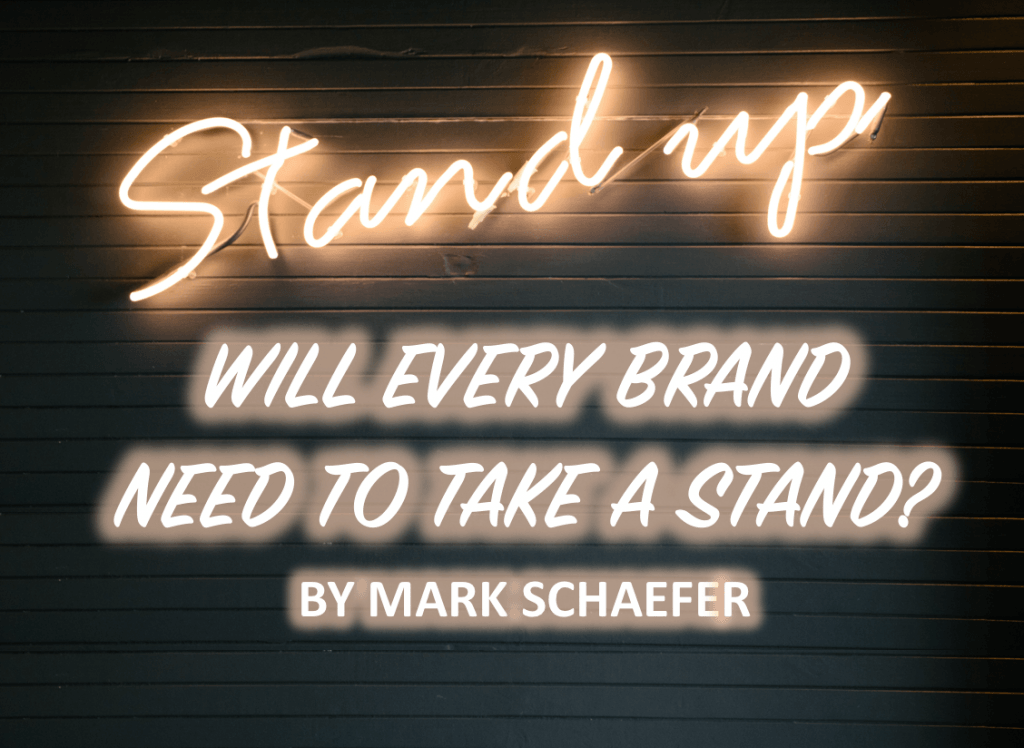
By Mark Schaefer
On a recent interview, I was asked if we are moving to a day when every brand and company will be forced to take a stand on politics and issues of the day. My tongue-in-cheek answer was “No, sometimes you just want a hamburger or a carwash without a debate!”
I don’t think everything in our lives will be politicized. That would simply be exhausting. But the fact is, times have changed and research conclusively shows that consumers today want to know what you stand for … especially if you’re a company in the public eye.
In many parts of the world, and especially in America, populations and companies are becoming highly politicized. Increasingly we are living in a world where there are Republican brands and Democratic brands.
Here is an interesting piece of research from Morning Consult on some top brands that are perceived to have some political association. This chart might be difficult to see on a mobile device since it is so detailed, but it is worth viewing on a larger screen:
Technology forces the hand
The implication of research like this is that a political stand might be a point of differentiation. Looking back at the brand history I’m aware of, I can’t think of too many examples … even from the recent past … where companies mindfully excluded large blocks of consumers because of a political view.
Social media has changed the DNA of the corporate culture, making it more connected, empathetic, transparent, and human. I started my career in corporate PR decades ago. The openness and honesty we see today was unimaginable back in the era of “controlling the message” and spinning the press around a topic. And that is a positive development.
What’s the strategy?
Today, brands are willingly (and unwillingly) being pulled into public battles that are driven by a customer’s values.
What’s unique now, is that the brand response is no longer binary. In today’s environment, brands that have quickly/swiftly removed themselves from the situation have often not been applauded, but hurt more for bending and cowering to another side. Brands that have pointed the blame elsewhere (like, say, blame the technology) have been bashed for being out of touch with how business works.
Brands that have distanced themselves from influencers that have run amok, are still accused of using them for when it works for the brand, but bailing on them when times get tough (meaning: not authentic). And more.
With the current climate, it’s hard to figure out what the course of action should be. Consumers want brands to be more personal. They want brands to stand for something … but what? Can companies like Coke and McDonalds that depend on selling billions and billions of things take a side?
The implications for branding and business strategy
This is an extremely interesting topic, and probably the start of a long conversation. There are fascinating implications for these ideas:
- Will the consumer world be divided up by political leanings? Will we have a choice between left-leaning coffee shops versus right-leaning ones?
- Will the social causes associated with a product be more important than price, convenience, or quality (and will those values prove to be a luxury or a necessity when we experience an economic downturn?)
- How do we prepare for the spiderweb of risk and even unintended consequences that occurs when a brand image is aligned with a person or a charity that may end up being corrupt?
- Is it possible to be interesting without eventually taking a stand?
I grew up in the Milton Friedman school of thinking that the purpose of the firm is to return shareholder value (and only shareholder value). Is that foundation of economics still true? Does the need to be politically sensitive overshadow traditional economics or are these new economic considerations that will actually fuel shareholder value?
What do you think? Where is this heading?
Illustration courtesy Unsplash.com